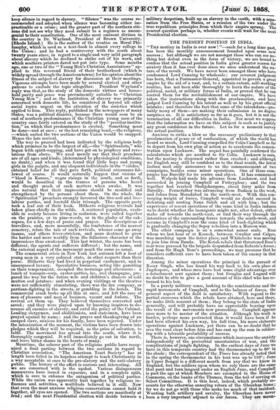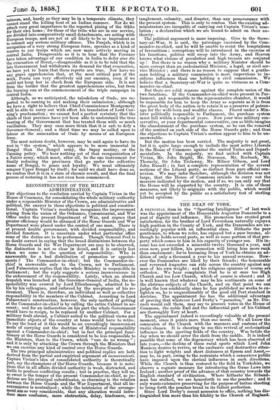THE PRESENT POSITION IN INDIA.
" THE mutiny in India is over now ! "—such for a long time past, has been the monthly announcement founded upon some new success ; but although we are not amongst those who can see no- thing but defeat even in the form of victory, we are bound to confess that the actual position in India gives greater reason for anxiety than it has ever done since we once understood the na- ture of the revolt. We have never been amongst those who have condemned Lord Canning by wholesale ; our severest judgment has been, that a Postmaster-General, appointed to govern a great empire by the aid of a vast, and, to a certain extent, self-working routine, has not been able thoroughly to learn the nature of the political, social, or military forces of India, or proved that he can control them for the reestablishment of our empire. We have taken the instructions along with the proclamation, and have judged Lord Canning by his intent as well as by his great official mistake ; and therefore the fact that some of the talookdars—pro- bably.many of them—are making their submission in no degree surprises us. It is satisfactory as far as it goes, but it is not the termination of all our difficulties in India. Nor must we suppose that the information we have on this subject is such as to justify any great confidence in the future. Let us for a moment survey the actual position.
Anxious to strike a blow as the necessary preliminary to that proclamation of peace or of confiscation, of which the world has heard so much, Lord Canning compelled Sir Colin Campbell so far to depart from his own plan of action as to accelerate the concen- tration upon Lucknow. The sequel has painfully confirmed the calculations which are ascribed to Sir Colin. Lucknow is ours, but the mutiny is dispersed rather than crushed ; and. although we English may still be confident as to the final result, the latest Indian mail only announces to us the commencement of two campaigns, besides some minor operations. One of thise cam- paigns has Bareilly for its centre and object. It has commenced well. Walpole had made his advance from Lucknow, and had succeeded in joining Campbell at Futteyghur ; and the two together had reached Shahjehanpore, about forty miles from Bareilly. Pennefather was advancing from Budaon in. the west, and Johns from Moradabad in the north-west. With this con- verging weight of forces, Campbell would no doubt succeed in defeating and routing Nana Sahib and all with him ; but the experience of recent operations of the same kind in India induces us to doubt whether the insurgents might not, after defeat, either make off towards the north-east, or find their way through the interstices of the surrounding forces towards the south-west, and resume in Campbell's rear the same kind of bush-fighting which is gradually changing the-Sepoy rebellion into a Maroon war. The other campaign is on a somewhat minor scale. Rose whom we last hear of at Koonch, between Gwalior and Calpee, was marching upon the latter place, and Whitelocke was moving to join him from Banda. The Kotah rebels that threatened Rose's rear were pursued by the brigade despatehed from Roberts's forces; and from Sir Hugh Rose's proceedings we may presume that he considers sufficient care to have been taken of the enemy in that direction.
Among the minor operations the principal is the pursuit of Kooer Singh, who has found his way back to his own place at Jugdespore, and whose men have had some slight advantage over a detachment sent against them ; but Douglas and Lugard will no doubt be able to give a good account of this chief who has re- turned to his lair.
In a purely military sense, looking to the combinations and the rapid movements of Campbell, and to the balance of forces, the general aspect of the field is satisfactory. With regard to the partial successes which the rebels have attained, here and there, we make little account of them ; they belong to the state of India generally, and will probably have no appreciable bearing upon the result of the movements now proceeding. Campbell appears once more to be master of the situation. Although his work is harder, perhaps more protracted than it would have been if he had been allowed his own way, his full time, his more elaborate operations against Lucknow, yet there can be no doubt that he sees the road clear before him and has cast up the sum in soldier- ing with a tolerable probability of success.
There is, however, one circumstance which increases the anxiety independently of the proverbial uncertainties of war, and the complications of jungle fighting. In the earliest days Of June we have in this temperate country had the thermometer up to 80° in the shade ; the correspondent of the Times has already noted that in the spring the thermometer in his tent was up to 110'; June in Upper Bengal is a different month from any that we know in England, but the soldiers upon whom we rely there are the same that pant and turn languid under an English June, and Campbell is past the age at which Members are exempted in the House of Commons, on the banks of the Thames, from the toil of serving on Select Committees. It is this heat, indeed, which probably ac- counts for the otherwise annoying return of the Ghoorkas home ; for we do not go with those who make too much of that incident. Wanting both artillery and cavalry, the Ghoorkas have never been a very important adjunct to our forces. They are moun- taineers, and, hardy. as they may be in a temperate climate, they cannot stand the killing heat of an Indian summer. Nor do we attach very great importance to the reported pining of the Sikhs for their own home ; for those of the tribe who are in our service, are divided into comparatively small detachments, are acting with European troops, and are. not at all likely to be so imprudent as to commit any serious military offence. The Punjab, which is in occupation of a very strong European force, operates as a kind of reserve to our troops which are now more actively moving in central India. Disagreeable as it is to hear that the Persians have taken advantage of our condition in India to defer sine die the evacuation of Herat,—disagreeable as it is to be told that the late Government had withdrawn its demand for that evacuation, we have yet to learn that these reports are true. Nor have we any grave apprehension that, at the most critical part of the work, Persia can very effectively aid our enemies, even if we could not keep her in check from the European side. It is not from the border that the greatest apprehensions arise, but from the burning sun at the commencement of the triple campaign in central India.
Although, as we anticipated, the talookdars of Oude, are re- ported to be coming in and making their submission ; although we have a right to believe that Chief-Commissioner Montgomery will be able to carry out with effect his translation of Lord Can- ning's proclamation ; we cannot feel a perfect certainty that the chiefs of that province have yet been able to understand the true bearing of the Government that has treated them with so much vacillation. They may once more think that it is safe to defy a Governor-General ; and a third time we may be called upon to labour at the annexation of Oude by means of an European force.
The most serious doubt, however, may be said again to have its root in " the system," which appears to be more immortal in Bengal than the Bengal army, the Sepoy mutiny, or the Canning policy. We hear nothing yet of that reorganization of a Native army, which must, after all, be the one instrument for finally reducing the provinces that go under the collective name of Bengal, to peace and loyalty. We must ultimately conquer Upper Bengal by itself ; for until we shall have done so, we confess that it is in a state of chronic revolt, and that the final process of restoring it has not even been commenced.



































 Previous page
Previous page